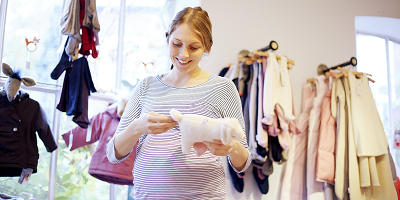Diapers
There are several different ways families can save big on diapers. The most cost-effective (and eco-friendly) way to save is to use cloth diapers instead of disposable ones. Cloth diapers have become so popular that you can now pick up a starter pack at any of your baby-centric big box retailers such as Buy Buy Baby or Target. Cloth diapers can be washed and reused until your baby outgrows them, but keeping your baby with a constant fresh supply will cost you more in terms of time, mess, and effort.
If you'd prefer to stick with disposable diapers, be sure to explore subscription services or a warehouse club membership. Major retailers like Amazon, Target, and Diapers.com will give you a discount for “subscribing” to weekly, bi-weekly, or monthly automatic shipments of diapers and other items for baby, and a warehouse club membership will generally give you a better price on diapers and wipes when you buy in bulk.
Breastfeeding or formula
Breastfeeding can save you a substantial sum on baby formula. If you have trouble breastfeeding initially, your health insurance may cover the costs of a breastfeeding consultation, or your hospital may offer such services to new mothers free of charge. Mothers who are particularly adept at breastfeeding should look into buying a breast pump so they can pump in advance and enjoy the freedom (and added convenience) that comes with having fresh breast milk bottled and ready to go wherever you are at feeding time.If you're committed to feeding your baby formula, don't leave the hospital or pediatrician's office without asking for free samples. You can trim your formula budget by following all of our same savings tips for disposable diapers: buy in bulk or subscribe, and sign up for those coupons! And while generic brand diapers may have a bad rap, you should know that generic baby formula is held to the same USDA standards as name brand formula. Your baby certainly won't judge you for buying generic!
Mothers who meet certain income and state residency requirements may also be eligible to receive Women, Infants, and Children (WIC) benefits, which go toward the costs of both baby formula and baby food, as well as wholesome, nutritional items for mama. (You can find out if you're eligible for WIC.) In the event that your baby requires specialized baby formula because of food sensitivity or illness, your formula expenses could be covered by your healthcare plan's Flexible Spending Account (FSA), if you have one.
Baby food
New parents trim their baby food budget by opting to make their own baby food instead of buying by the jar. All you need is a hand blender or baby food mill, a well-stocked fridge full of fresh fruits and veggies, and a sizable freezer. Most (but not all) fruits and veggies will need to be baked, boiled, or steamed before being cooled and fed to your baby.
When making your own food, it's also important to be aware of what fruits and veggies babies should and should not consume when they're under 3 months old. You can find step-by-step guidelines for making your own baby food on BabyCenter, and lots of easy, healthy recipes on Wholesome BabyFood.
If you need more help with your pre-baby budget plan, or you'd like more budgeting tools for the family, please visit the Protective Learning Center.




